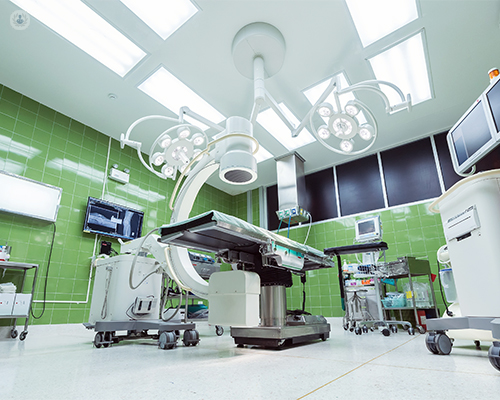

What is cancer surgery?
Cancer surgery is the removal of cancer from a patient’s body by a specialist surgeon. At the same time as the cancer is removed, the surgeon may also remove adjacent tissue that may contain cancerous cells. Surgical procedures may also be used to prevent, diagnose or determine the stage of cancer.
Anaesthesia is used during surgery so that the patient is numb or unconscious. The anaesthesia may be:
- Local: numbness of a small part of the body.
- Regional: numbness of part of the body (a leg or arm).
- General anaesthesia: complete numbness and loss of consciousness.

Why is it done?
Cancer surgery is done to treat, prevent, diagnose and determine the stage of cancer. There are other cases too, for example, relieving discomfort.
- Surgery to diagnose cancer: remove some tissue to perform tests on it. This procedure is called a biopsy.
- Surgery to determine the stage of cancer: to determine the extent of the cancer and subsequently the appropriate treatment.
- Curative surgery: when the cancer is confined to a specific part of the body and can be completely removed.
- Palliative surgery: to treat complications caused by advanced cancer. For example, to reduce discomfort or disability. It can also be used to control pain. In short, it seeks to improve the patient’s quality of life, not to treat or cure the cancer.
- Supportive surgery: to facilitate the use of other treatments.
- Reconstructive surgery: to improve the appearance of patients who have undergone major cancer surgery, such as breast reconstruction surgery.
- Preventive surgery: to remove tissue that has the potential to become cancerous. The aim is to reduce or eliminate the risk of cancer, but there is never 100% certainty.
What does it involve?
In many cases, the surgeons use scalpels and other sharp instruments to cut parts of the body, such as the skin, muscles and sometimes, bone.
Depending on the type of cancer and how advanced it is, the surgery will:
- Remove all of a tumour: remove a cancer confined to one area.
- Reduce the tumour: remove part of the tumour. This is done when removing the entire tumour would possibly damage an organ. It can be used to improve the effectiveness of other treatments.
- Relieve symptoms: remove tumours that are causing compression or pain.
How to prepare for cancer surgery:
Before cancer surgery, you will undergo different tests and examinations to allow the doctor to evaluate your surgical needs. Some of the common tests include:
- Blood analysis
- ECG
- Chest X-ray
Often, you may be asked to avoid eating or drinking for a certain period before the surgery.
Care following surgery:
Care following cancer surgery varies according to the cancer type. You will probably have to remain in hospital for a while after the intervention. In addition, you will have regular appointments with the specialist, who will evaluate your progress and remove sutures, for example.
Your doctor may give you some instructions to follow after surgery, possibly including:
- Food
- Instructions about how to care for wounds
- Medications
- How to control pain
- Which activities you can do
- When you can return to work
Alternatives to this treatment
Cancer treatment varies according to cancer type, its stage and its location, among other factors. Surgery is particularly effective when the tumour has not spread to other parts of the body and, in such cases, the possibility of a cure is greater. Surgery may also be used to treat problems caused by the cancer, such as removing a tumour blocking the intestine.
There are other treatments that can be applied before, after or together with surgery:
- Radiotherapy
- Chemotherapy
- Immunotherapy
- Targeted therapy
- Hormone therapy
- Stem cell or bone marrow transplant
